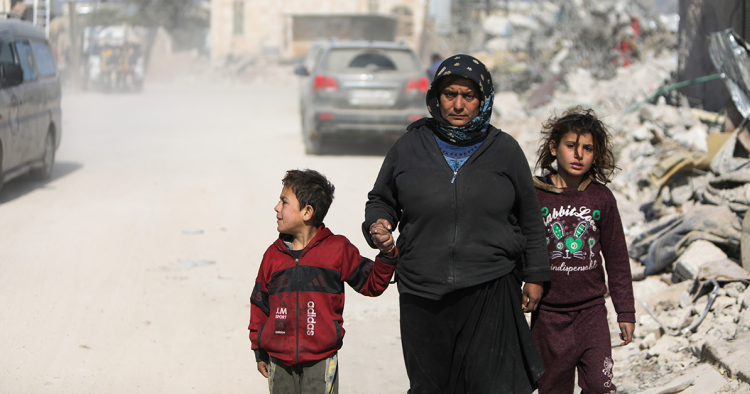On March 20, the EU will hold an international donors' conference in Brussels to raise funds for Turkey and Syria’s recovery from the devastating earthquakes that struck in early February. While Turkey's foreign minister will speak before the pledging session, no one will represent or even speak on behalf of Syrians.
Various parties objected to inviting an organization affiliated with the Assad regime to speak on behalf of the whole country. Instead, the EU opted not to invite any Syrians at all. Not representing Syria at the conference is wrong as it further disempowers the very same people the donors are trying to help. Misrepresenting them would have been even worse.
The earthquakes hit Turkey harder in terms of casualties (48,000 vs. 6,000) and estimated direct physical damage ($34 billion vs. $5 billion), and they came at a time when Turkey’s economy was already struggling. Still, Syria is far more vulnerable, with nearly 90% of the population living in poverty and half of all Syrians internally displaced or in exile abroad.
Syria’s complex topography has made the international response more difficult. Although Bashar al-Assad’s government regained control over two-thirds of the country, backed militarily by Russia and Iran, Syria remains fragmented: Remnants of the opposition have been driven to the northwest, some in zones under Turkish control, while U.S.-backed Kurdish-led militias control more than a fifth of the country in the northeast.
The earthquakes struck areas both inside and outside Assad regime control, but the majority of deaths were in the rebel-held northwest, where 4,500 people died as the international community stood watching by, prioritizing protocol over human life.
In those first few days most critical for saving lives, planes laden with relief from around the world flew over the heads of civilians in northwest Syria, only to land next door in Turkey and Assad-held areas.
The “failed” response was so appalling the U.N.-appointed Commission of Inquiry on Syria called on March 13 for an investigation into the roles of the Syrian government, the U.N., and others in the delays in getting emergency aid to northwest Syria, where the healthcare infrastructure was already brutalized by years of regime and Russian bombing. The March 20 conference is a chance to rectify that grave injustice.
While the generosity of donors is greatly appreciated, the job cannot end after signing the checks.
Nowhere is aid diversion more blatant than in regime-held Syria, where the key facilitator of the humanitarian response, the U.N., has failed repeatedly. Some of that failure is due to regime coercion and the U.N.’s operational and institutional frameworks, but an integral part is due to corruption and incompetence.
The Financial Times recently revealed that Syria’s spy chief has a daughter working for the U.N. in Damascus, while our earlier research shows that nearly a quarter of U.N. procurements inside regime-held Syria come from individuals sanctioned by the U.S., EU, or the U.K. for their role in supporting the regime. Another investigation showed that the World Health Organization handed over gold coins and cars to regime officials.
Donors in Brussels need to ensure accountability to aid recipients, which can only happen with stricter and more transparent monitoring.
EU organizers must also urge rich Arab Gulf states to live up to their humanitarian responsibilities. Despite playing a direct role in the conflict, their share of funding to the humanitarian response in 2022 stood at a meager 2%, as reported by the U.N.’s Financial Tracking System. All hope is lost on Assad’s backers, Iran and Russia, whose humanitarian spending in Syria is virtually nonexistent, despite playing a pivotal role in destroying the country.
Much of the humanitarian response since the outbreak of war has been geared towards meeting people’s basic needs for survival, such as food and shelter, not to helping them lead more dignified lives and building their local economies. Twelve years into the conflict, and with no political solution on the horizon, more of the earthquake response should be directed toward helping Syrians recover and rebuild their livelihoods.
The rampant misuse of U.N.-facilitated spending gives yet more reason for the earthquake response to focus on working with local actors directly.
Everyone deserves an equal chance to rebuild their lives following a natural disaster. Despite the great intentions, failing to understand Syria’s complex context will only ensure an unjust response. A little knowledge is a dangerous thing.
Dr. Karam Shaar is a non-resident senior fellow at Newlines Institute and an independent consultant on Syria. You can follow him on Twitter @Karam__Shaar or at www.karamshaar.com.
Photo by Bekir Kasim/Anadolu Agency via Getty Images
The Middle East Institute (MEI) is an independent, non-partisan, non-for-profit, educational organization. It does not engage in advocacy and its scholars’ opinions are their own. MEI welcomes financial donations, but retains sole editorial control over its work and its publications reflect only the authors’ views. For a listing of MEI donors, please click here.













